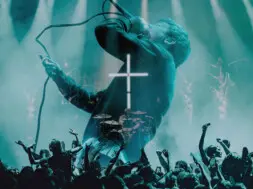
One of the great paradoxes of rock culture today is that for for all the genre’s heritage of rebellion and rejecting the establishment, it breeds an awful lot of conservative thinking. If a band dares to push themselves musically or, shock horror, dabble in a genre beyond their norm, the instant reaction of a battalion of keyboard warriors is to yearn for the golden age of 18 months ago when they were “actually heavy” and not “generic” (an adjective that has been misused to the point of meaninglessness post-YouTube).
It was thus surprising how well the first taste of material from Headspace, the second Issues album proper, was received. “The Realest” was almost completely devoid of screaming, breakdowns or anything else that could characterize it as a metalcore song, but the band’s fanbase not only rolled with the change, they lapped it up. Maybe it’s because the self-titled Issues album had such a laissez-faire attitude to genre in its own right; maybe it’s the breaking down of walls between the rock and pop universes that’s resulted from the rise of PVRIS, Twenty One Pilots et al. In any case, Issues appear to be the exception to the norm in that the majority of fans realize that they’re a better band when they’re playing pop songs with heavy guitars than they are at being anything like a proper metal band.
In this respect, they’re the 2010s Warped Tour equivalent of Linkin Park. It was easy to make connections between the first Issues album and Hybrid Theory, and though the Atlanta group didn’t achieve nearly the same levels of success as their Californian peers, they both stood out as the black sheep of the scene that birthed them thanks only partly to the healthy appreciation of pop music evident within their sound. It is admittedly a stretch to conceive of Headspace as Issues’ Meteora, but it’s not a metaphor completely devoid of substance.
In both cases, the band’s second album is not a dramatic departure from the first, but does push a little further into the non-rock portion of the band’s “original” sound, and also flirts with even more left-field new elements (“Yung and Dum” doesn’t go full country rock as had been suggested by the members of Issues, but the jaunty violins and barnyard-swelling refrains do enough to set it apart from anything else in any band’s repertoire.) The interplay between Tyler Cater and Michael Bohn is still as crucial to the band’s sound as the vocal tag team of Chester and Mike was to old-school LP. There’s even an instrumental, melodic beat-driven penultimate track “I Always Knew” that feeds into a brooding, “Numb”-esque closer. “Slow Me Down” also proves to be one of the best cuts on the album, not least for the balance between mournful guitar and latent aggression from the band as a whole.
These comparisons are more or less the only ones that can be made between Headspace and the work of other bands, because if nothing else it’s a confirmation that Issues are working firmly in a field of one. Their push towards R&B has solidified their uniqueness, to the point that AJ Rebollo’s guitars act more frequently as a muscular arm to push the backbeat forward than they do in a traditional rock or metal manner. The musicians have as one made a noticeable step-up in skill, though Skyler Acord turns in the most noteworthy performance, and without a bassist as good as he the more rhythm-oriented approach to these songs wouldn’t work as well as it does. The other major innovation on Headspace is Bohn beginning to provide clean vocals, and while he’s never going to outshine a singer as skilled as Tyler Carter he is extremely effective as a more raw counterpoint. Carter himself is as brilliant as you’d expect, with “Home Soon” standing out as the most explicit showcase of his skills on an album that’s full of them.
As on the self-titled, the most enjoyable tracks are those in which Issues make the greatest deviations from their chart pop/djentcore bread and butter. “Flojo” steals the show at the centre of the album, dropping a full-on 90s boy band chorus over what can only be described as Swing Goes Metal. The most viscerally exciting cut is predictably the 2016 rage against the machine anthem “Blue Wall”, which pulls off its anti-police corruption theme with aplomb. The gunshot sample leading into the siren-topped breakdown works surprisingly well, and the deeper growls in the chorus are a welcomely intense deviation from the syrupy hooks of elsewhere.
Issues are at their best when they fully embrace their ludicrousness, and thus the biggest weakness of Headspace is that it has too many moments that don’t stand out. The band do well to give each track its own talking point; whether it’s the jazz guitars that make Dance Gavin Dance the obvious reference point for “Hero”; painfully personal lyrics on “Someone Who Does”; or the key change at the end of “Lost-n-Found” (key changes make everything better). However, because Issues are pushing the boat out so far on certain songs, those that do sound more alike suffer. This is a balance they got better on the self-titled, which was so ruthlessly devoid of filler that any follow-up would inevitable have suffered.
Its follow up is thus an improvement in terms of musicianship and its diversity of influences, but an overall downward step in regards to song quality and consistency. Issues would still clearly be ahead of their genre peers, but at this point they don’t really have any; they’re too intense for your average Panic! At the Disco fan but far too weird to be filed alongside Of Mice & Men or Memphis May Fire. Headspace shows more creativity across its 13 tracks than many bands do over 13 albums, and packs more than enough bangers to satisfy the legions who recognize how special this band is. Regardless of whether you prefer Hybrid Theory or Meteora, the band who made it are very good at what they do. The same is true of Issues.




























